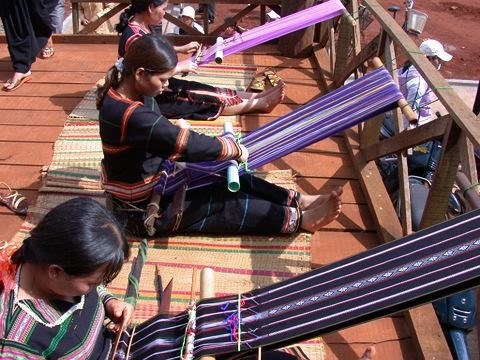
The first festival to honour the Vietnamese brocade culture will be held from December 27 to 30 in the Central Highlands province of Dak Nong.

The first festival to honour brocade will be held from December 27
to 30 in Central Highlands province of Dak Nong. (Photo visittourvietnam.com )
The first festival to honour brocade will be held from December 27
to 30 in Central Highlands province of Dak Nong. (Photo visittourvietnam.com )
Themed Vietnamese Brocade Culture Festival in Dak Nong, the
festival will have a wide range of cultural activities and art performances.
Brocade is traditionally made from cotton and flax yarn material found in the
forest. Its patterns are dyed in natural colours.
The patterns on brocade fabric often reflect the traditions of ethnic groups.
The brocade weaving tradition is preserved and inherited in each ethnic family
by women.
In fact, most brocade products are fabricated by Mong locals, mostly skilful
and meticulous craftspeople, in the northern mountainous provinces of Ha Giang
and Lao Cai as well as others in the Central Highlands.
Handmade brocade products, both in the past and present, have been closely
associated with the habits and customs of most of the Vietnamese ethnic groups.
Brocade fabric, for example, serves as essentials or goods and is even used in
marriages.
The festival aims to underline the importance of the preservation and
development of ethnic groups’ brocade in the process of global integration.
Visitors will get a chance to learn more about brocade made by different ethnic
groups in Vietnam.
The festival will demonstrate brocade weaving to introduce visitors to the
process.
A fashion show, including traditional and modern brocade designs, will be the
highlight of the festival.
High-quality brocade products will also be displayed for sale.
The festival will include folk games and art performances.
Artistes and artisans from different ethnic groups will meet at the event for
cultural exchange.
They will perform traditional art forms introducing the history and culture of
ethnic groups.
The four-day event is expected to be held biennially in Gia Nghia town.
Source: VNA
With an increasingly vibrant and widespread emulation movement aimed at building cultured residential areas and cultured families, Yen Thuy District has been making steady progress toward improving both the material and spiritual well-being of its people, while fostering a civilized, prosperous, beautiful, and progressive community.
Once lacking recreational spaces and community facilities, Residential Group 2 in Quynh Lam Ward (Hoa Binh City) has recently received attention for the construction of a new, spacious, and fully equipped cultural house. The project followed the model of state support combined with public contributions in both labor and funding.
The "All people unite to build cultural life" movement, which has been effectively integrated with Kim Boi district’s socio-economic development goals, is fostering a lively spirit of emulation across local residential areas, hamlets, villages, public agencies, and enterprises. In addition, through the initiative, traditional cultural values are being preserved and promoted, while community solidarity and mutual support in poverty reduction and economic development are being strengthened.
A working delegation of the Hoa Binh provincial People’s Committee led by its Permanent Vice Chairman Nguyen Van Toan on June 11 inspected the progress of a project to build the Mo Muong Cultural Heritage Conservation Space linked to tourism services in Hop Phong commune, Cao Phong district.
Born and growing in the heroic land of Muong Dong, Dinh Thi Kieu Dung, a resident in Bo town of Kim Boi district, in her childhood was nurtured by the sweet lullabies of her grandmother and mother. These melodies deeply imprinted on her soul, becoming an inseparable part of her love for her ethnic group's culture. For over 20 years, this love for her hometown has driven Dung to research, collect, and pass down the cultural values of the Muong people to future generations.
In the final days of May, the Ethnic Art Troupe of Hoa Binh Province organized performances to serve the people in remote, mountainous, and particularly disadvantaged areas within the province. These were not just ordinary artistic shows, but they were the meaningful journeys aimed at spreading cultural values, enhancing the spiritual life of the people and contributing to the preservation of ethnic minority cultural identities.



